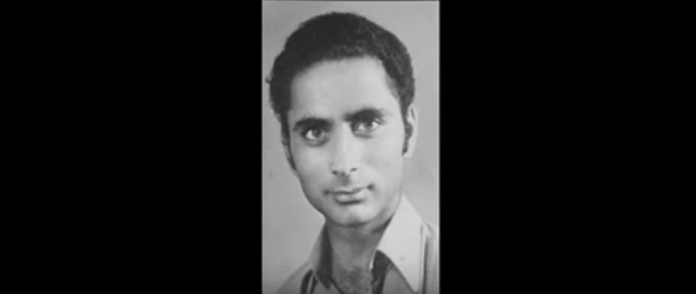The radical Punjabi poet, labelled a Naxal and assassinated by Khalistanis, was born on this day in 1950.
New Delhi: When journalist-turned-activist Gauri Lankesh was murdered on 5 September 2017, her supporters rallied to print a poster — dissent, it read, would not be silenced.
The poem that adorned the poster was Sab Ton Khatarnak (Most Dangerous) — the work of the radical Punjabi poet Avtar Singh Sandhu, better known as Pash.
Had it not been for the bullets of Khalistanis, Pash would have turned 68 today — he was born on 9 September 1950.
Pash grew up in the inquilaabi shadow of his heroes, Bhagat Singh and Vladimir Lenin, and it shouldn’t come as a surprise that his poems addressed socio-political issues such as the oppression of landless farmers, religious fundamentalism, corrupt traders and politicians, and unethical industrialists.
For his beliefs, he was arrested thrice during his lifetime on suspicions of being associated with the Naxal movement in Punjab.
“Bomb our university, destroy our hostels
Throw your white phosphorous on our slums
But you will not end me. I am grass.
I grow on everything”. – I am grass, by Pash.
The ‘revolutionary’ poet
Popularly identified as a progressive and radical poet, Pash’s poetry, which is in Gurumukhi, is both emotionally charged and theoretically grounded. His first collection of poems was Loh Katha (A Tale of Iron).
In Most Dangerous, Pash writes that it is not corruption or murders that are the most dangerous, it but the “death of our dreams”. There is optimism in his work.
A “Resistance Poet”, Pash was able to vocalise the sentiments and anger of those who otherwise went unacknowledged. For that, he has been called “dangerous”.
To speak a Brechtian tongue, Pash’s poetry leaves one simmering with rage for the daily oppression that people often become numb to. He teaches one to question, to think and not to cower under pressure.
Also read: As India mourns legendary Neeraj, is the era of poetry over in Bollywood music?
A life cut short
In a span of 40 years, Pash wrote close to 200 poems, before he was assassinated on 23 March 1988, by Khalistani militants. Incidentally, 23 March is the martyrdom day of Bhagat Singh.
Pash had been a vocal critic of Sikh militant Jarnail Bhrindanwale and had fled the country. However, since he was living in the US on a tourist visa, he had to travel back in order to renew it.
The day before Pash was scheduled to leave for the US, he and his friend Hansraj were shot near Jalandhar.
Troubled legacy
In 2006, BJP leader Ravi Shankar Prasad, then a Rajya Sabha MP, opposed the inclusion of Pash’s poetry in class XI textbooks because his work was “objectionable”. The debate was revived last year after RSS ideologue, Dinanath Batra, pushed the demand again. There has been collective opposition to the move.
Pash’s words, however, are more relevant for the present times. It would bode well to remember his timeless lines:
Being looted of one’s labour is not the worst thing
Nor is police torture
Even betrayal out of greed
And arrest without warning
Are not the most terrible
To be frightened into silence is bad
But not really dangerous
To be drowned in the noise of corruption
Even when one knows one is right is no doubt bad
Reading in the feeble light of
a glowworm
Going through life with a frown are also no doubt bad
But they are not the worst
Most harmful to oneself is to reduce life to passivity
To lack intensity of desire
To bear everything
To become a creature of routine
Most dangerous of all is the death
of our dreams…
(Most Dangerous by Pash)




Lot of pro Congress writers rote a many negative things about Sikhs in the 80s era, as part of strategy to eliminate Sikhs completely. He is perhaps one of them.